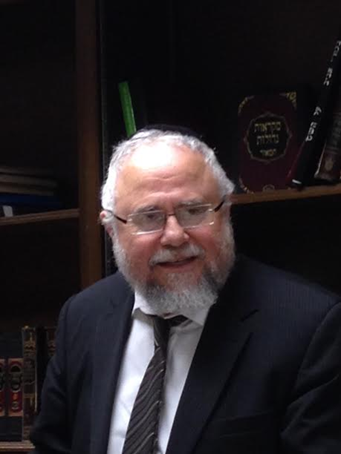Rabbi Avraham Yakubovich: The Challenge of Intermarriage
For forty years, Rabbi Avraham Yakubovich lived in the United States, establishing an innovative project for teaching students and nurturing Jewish identity. Thousands of students were drawn closer to Judaism, but there were also painful cases of intermarriage. "Intermarriage abroad reaches 50%", he says, "and in most cases, the intervention comes too late."

For the past eight years, many students in Israel have known that if they are looking for a warm home or a place to spend Shabbat in a pleasant atmosphere, they are always welcome at the Yakubovich family's house in Ramat Beit Shemesh.
Rabbi Avraham Yakubovich and his wife have turned their home into a sort of community center, offering students and many guests accommodations, meals, and a warm and friendly atmosphere. "From the outset, when we bought the house, we planned that it would not be just our private space," Rabbi Yakubovich explains. "The first floor is entirely dedicated to guests – there’s a library, kitchen, and 15 beds. During the week, this floor serves as an evening seminar for girls. Lectures and classes are given, and there’s a very rich library with more than 3000 books in English."
Rabbi Yakubovich also works on another front, delivering lectures and talks in the army to strengthen Jewish perspectives and identity. "The soldiers really need it," he says.
Alongside his work in Israel, he frequently travels abroad, as he is very active in universities there to promote Jewish studies and combat the intermarriage epidemic.

A Successful Project
"For forty years I lived abroad," Rabbi Yakubovich shares about himself. "Although I was born in Israel, at the age of 16, I moved with my parents to live in the USA and studied for seven years at the Mir Yeshiva in Brooklyn. After my marriage, I moved to Detroit and studied there in a kollel for several years."
Throughout, Rabbi Yakubovich found himself deeply connected to the mission of bringing distant Jews closer to Judaism, leading him to establish a special kollel aimed at Jews who wish to connect with Judaism. "I rented a building and established the kollel there. Additionally, I founded a synagogue and a library."
In a short time, the project gained momentum, and seeing the great demand, Rabbi Yakubovich decided to establish another project at the University of Michigan, offering students Jewish studies. "I would frequently come to the university with other young scholars and study with Jewish students who were not religious. We called ourselves the 'Institute for Torah'."
How do you explain that non-religious Jews were interested in Judaism?
"You have to understand that when talking about universities abroad, the numbers are very large. Out of a university with 35,000 students, there are about 6,000 Jews. It's not surprising that we found some who showed interest."
Soon the project expanded beyond the University of Michigan to other places. "I found myself traveling every week across America, organizing study sessions and lectures and Shabbaton events," recalls Rabbi Yakubovich.
Where did the funding come from?
"We mainly received funding from the local community. Occasionally, we held dinners where people generously contributed. The project handled about half a million dollars a year, and with Hashem's help, we managed to sustain it."
Seventeen years ago, Rabbi Yakubovich and his colleagues noticed that more and more students were interested in the learning project, but not all were persistent. "We decided that something needed to be done to formalize the lectures and ensure students continually attended. We decided on a new approach – we would pay a $500 scholarship to anyone who attended for ten weeks, committing to studying three hours a week and participating in Shabbatonim in Detroit and Chicago. In the first group we founded, there were 17 students who really connected to the subject, and it was a tremendous success. To this day, I maintain a close connection with them; among them, 13 have become Torah and mitzvot observant, which is simply moving."
By the second semester, dozens of new students registered for the project. "The second time was also very successful, and we understood that if we succeeded there, there was no reason we couldn't succeed elsewhere," says Rabbi Yakubovich. "Thus, we started operating the program at additional universities across the US, and today there are more than 50 of our branches. Later, the esteemed Wolfson family also sponsored the project, funding much of it."
What do you actually do in meetings with students?
"Our program is uniformly structured everywhere – it starts with a perspective class, followed by discussion groups, and afterwards, a guest lecturer comes, not necessarily a rabbi, but a religious person who can enrich us and share his view of Judaism. I remember we once asked a local Jewish man to lecture for us, and he hesitated. He claimed he was not a Torah scholar but a businessman and wasn’t sure he had anything to say to the students. I instructed him to just tell them about himself, to show them what a businessman's life looks like. In the end, his lecture was particularly moving. He told the students how he wakes up every morning at five-thirty to study the daf yomi before he prays and goes to the office. When asked where his children study, he replied that just last week he took his son to Israel on his private plane to be tested at one of the yeshivas. Their amazement was immense. There's nothing like real-life examples to bring hearts closer together."
The Jewish People's Problem: Intermarriage
Throughout, Rabbi Yakubovich encountered the painful and prevalent issue of intermarriage abroad. "Unfortunately, I know this closely, and it really pains me," he notes. "I remember the days 40 years ago. Back then, there were talks of 10% intermarriage abroad, but still, someone whose son entered an intermarriage would usually be embarrassed. Some even denied it because they were viewed as not respectable. What happened in the following years is that it became more and more accepted. Many students contact us today wanting to join the project. They say their mother is Jewish and the father is not. Out of ten who come, I can say that usually, four have a non-Jewish father. Frequently, those born from intermarriage come to us, where the father is Jewish and the mother is not, which is, of course, very sad."
What are the current intermarriage rates?
"There are no official figures for the number of intermarriages today, but from my personal estimation, when talking about the US, they reach about 50%."
Rabbi Yakubovich's extensive dealings with the issue also led him to write a book about it. The book 'Tzemet or Hemet' is being published these days. "Ten years ago, I published this book in English, and now I have decided to release the Hebrew edition, with a broader scope suitable for the Israeli audience. I also added general material on marriage in the spirit of Judaism."
What new insights do you present in the book?
"The fundamental thing I explain is that many Jews abroad think we oppose intermarriage because we are racist, don't like non-Jews, and don't want them, which is not true. I explain throughout the book that this has nothing to do with racism, but one must understand what a Jew is, what a person's purpose is, what love and marriage are. Only at the end of the book, after understanding the deep essence of marriage and what profound subject lies within it, can one begin to understand how it is a spiritual issue. A romantic bond between humans is different from a bond between animals. A horse and a mare do not get married, because marriage, by its nature, is a spiritual matter. Therefore, when two humans are spiritually different, one cannot possibly connect them. It's entirely irrelevant.

"I have also had the occasion to give lectures where mixed couples sat in the audience. After the talk, they approached me and said: 'We actually understand'. They weren’t angry; they simply understood we have nothing against non-Jews, but there is something deep and fundamental that prevents intermarriage."
Do you see success in your activities?
"I would divide it into two – when I manage to talk to mixed couples dating but not yet married, there are many cases where I succeed in leading to breaking off the relationship. But after they are married or engaged, successes are close to nil. In such cases, the options are either to convert properly according to halacha or to separate. The conversion option is usually dismissed by the Jewish spouse, because it requires them too to keep mitzvot and become religious, and mentioning separation is almost impossible because it is very difficult to argue with feelings and love created between people. In such cases, I am truly just hoping and praying for a miracle."
For details and contact, free of charge:
AMA and Prisoner Department – Free assistance, advice, and guidance for women in distress:
Tel: 073-2221333, Mobile 052-9551591. Email kalina@htv.co.il

